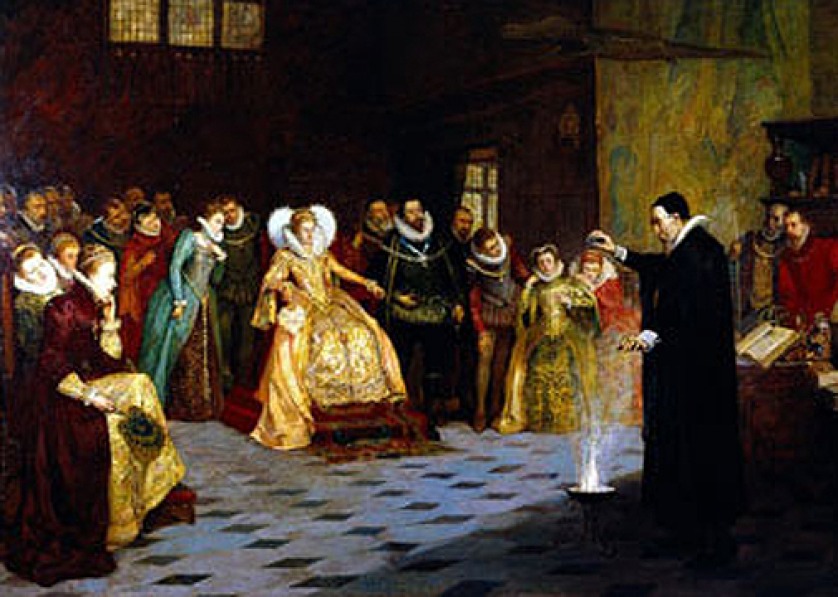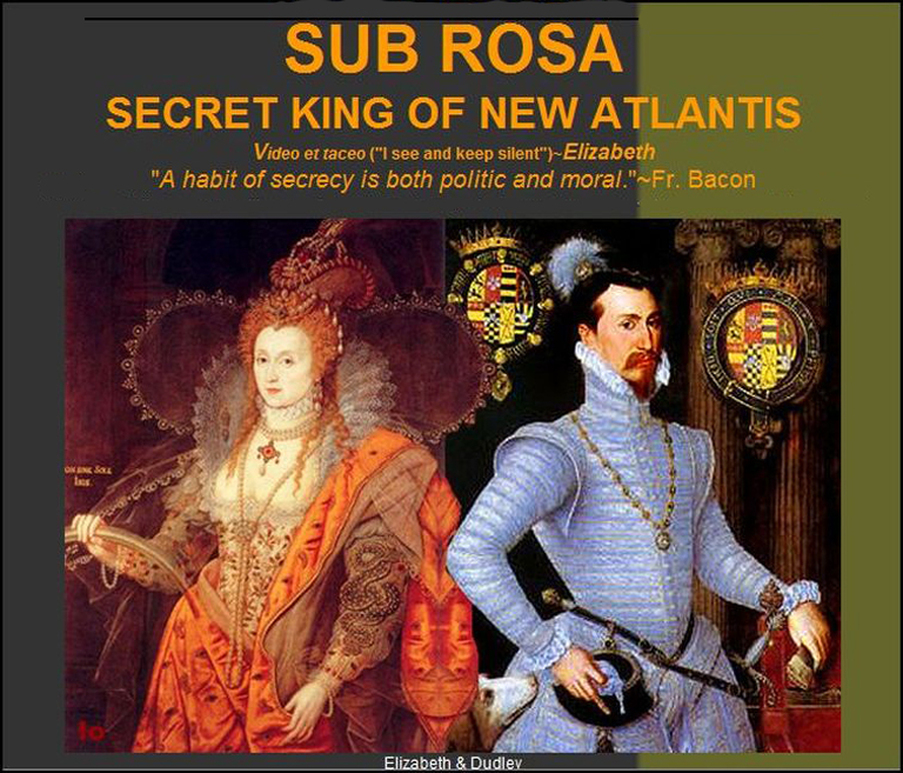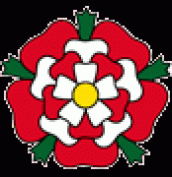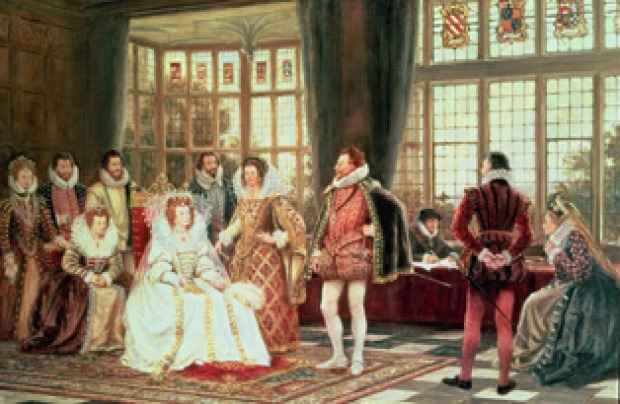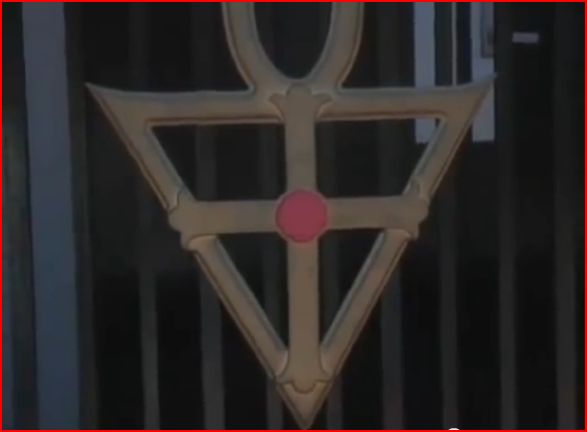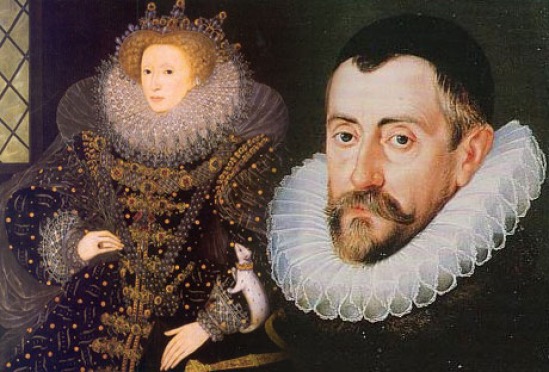SUB ROSA:
The Secret King of New Atlantis
Film Proposal by Iona Miller, 2007-2014
“In time the secret truth shall be revealed.”
~Francis Bacon, New Atlantis, 1617
more here:
http://baconisshakespeare.50megs.com/index.html
PLOT SYNOPSIS ~Elizabeth I meets Shakespeare in Love meets The da Vinci Code
Video et taceo ("I see and keep silent") ~Elizabeth
"A habit of secrecy is both politic and moral." ~Francis Bacon
Lies, Spies, and Deep Cover
Was Sir Francis Bacon a concealed Tudor Prince; did this Master and genius pen “Shakespeare"?
Many experts contend it is so…This version of his illustrious life is an uncollapsable probability cloud of fact and fantasy. Only his genius could not be concealed. A stealthy undercurrent of denial, disguise, deception, betrayal,
spy networks and secret societies ran through Bacon's life, shaping him as he shaped his world with intelligence. The language of the Occult is a hidden language. Bacon hid his dangerous political truth in cyphers learned from his mentors, Magus John Dee and Sir Francis Walsingham the Spymaster. For the illiterate he used the common visual code of graphic symbols and emblems. The love of his life, Marguerite, is concealed in The Sonnets, and his wit, family history, political and social commentary in the Plays. The Tempest is a portrait of his mentor, Dr. Dee.
Video et taceo ("I see and keep silent") ~Elizabeth
"A habit of secrecy is both politic and moral." ~Francis Bacon
Lies, Spies, and Deep Cover
Was Sir Francis Bacon a concealed Tudor Prince; did this Master and genius pen “Shakespeare"?
Many experts contend it is so…This version of his illustrious life is an uncollapsable probability cloud of fact and fantasy. Only his genius could not be concealed. A stealthy undercurrent of denial, disguise, deception, betrayal,
spy networks and secret societies ran through Bacon's life, shaping him as he shaped his world with intelligence. The language of the Occult is a hidden language. Bacon hid his dangerous political truth in cyphers learned from his mentors, Magus John Dee and Sir Francis Walsingham the Spymaster. For the illiterate he used the common visual code of graphic symbols and emblems. The love of his life, Marguerite, is concealed in The Sonnets, and his wit, family history, political and social commentary in the Plays. The Tempest is a portrait of his mentor, Dr. Dee.
DEFINING MOMENT
"The Divine Majesty takes delight to hide his work … according to
the innocent play of children … Surely for thee to follow the
example of the Most High God cannot be censured … Therefore, put
away popular applause … and after the manner of Solomon, the King
… compose a history of thy time and fold it into enigmatical
writings … and cunning mixtures of the theatre …"-Francis Bacon
DEFINING MOMENT: 1579. Bacon’s Celestial visitation -- a clairaudient experience: "The glory of God is to conceal a thing, but the glory of a King is to find it out." "A flame of fire which fills all the room and obscures our eyes with its celestial glory -- heavenly voice. Follow the example of God. Put away popular applause. Compose a history of thy times and fold it into enigmatical writings and cunning mixtures of the theatre mingled as the colors in a painters shell and it will in due course of time be found."
His plan: 1) catalogue and systematize "all the world's knowledge." (in English Language) 2) appear as model son to the Queen. Aid and support the administration of her realm. Give good advice. Enhance her image. Stay hidden behind the scenes. 3) Commit the true story to several ciphers. Live a secret (double) concealed life.
"The Divine Majesty takes delight to hide his work … according to
the innocent play of children … Surely for thee to follow the
example of the Most High God cannot be censured … Therefore, put
away popular applause … and after the manner of Solomon, the King
… compose a history of thy time and fold it into enigmatical
writings … and cunning mixtures of the theatre …"-Francis Bacon
DEFINING MOMENT: 1579. Bacon’s Celestial visitation -- a clairaudient experience: "The glory of God is to conceal a thing, but the glory of a King is to find it out." "A flame of fire which fills all the room and obscures our eyes with its celestial glory -- heavenly voice. Follow the example of God. Put away popular applause. Compose a history of thy times and fold it into enigmatical writings and cunning mixtures of the theatre mingled as the colors in a painters shell and it will in due course of time be found."
His plan: 1) catalogue and systematize "all the world's knowledge." (in English Language) 2) appear as model son to the Queen. Aid and support the administration of her realm. Give good advice. Enhance her image. Stay hidden behind the scenes. 3) Commit the true story to several ciphers. Live a secret (double) concealed life.
Francis Bacon (b. 1561) had an auditory revelation of his cultural mission. He wrote the utopian novel NEW ATLANTIS sometime between 1610 and the early 1620's, but it was first published after his death in 1626. Bacon used the model of his fictional island of Bensalem as a sounding board for his ideas on politics, science, language, education, society and religion.
In this utopia, science was paramount to the advancement of the society as a whole. Inventions and inventors were lauded by the people, and encouraged by the government. He described the democratic nature of his mythic kingdom, which many felt inspired his interest in the Virginia Company and other settlement of the New World. Some of his Rosicrucian ideals took root in America. The concept was to raise consciousness through advancement of learning through knowledge. He prepared an esoteric blueprint for colonizing the New World.
Knights of the Helmet was another of his secret societies, whose patron was the goddess Athena known to shake her spear in the face of ignorance. Clandestine matters were discussed in secret societies to avoid both church and state. http://baconisshakespeare.50megs.com/whats_new_4.html
In this utopia, science was paramount to the advancement of the society as a whole. Inventions and inventors were lauded by the people, and encouraged by the government. He described the democratic nature of his mythic kingdom, which many felt inspired his interest in the Virginia Company and other settlement of the New World. Some of his Rosicrucian ideals took root in America. The concept was to raise consciousness through advancement of learning through knowledge. He prepared an esoteric blueprint for colonizing the New World.
Knights of the Helmet was another of his secret societies, whose patron was the goddess Athena known to shake her spear in the face of ignorance. Clandestine matters were discussed in secret societies to avoid both church and state. http://baconisshakespeare.50megs.com/whats_new_4.html
Bacon Ciphers in Shakespeare were proposed in The Great Cryptogram by Ignatius Donnelly
http://books.google.com/books?id=Z5INAAAAYAAJ&printsec=frontcover&dq=%22The+Great+Cryptogram%22+Ignatius+Donnelly&source=bl&ots=pR09NdGhvR&sig=BRRZfeXu5XpXS7h_xrB5vkiVz2I&hl=en&ei=jU3nTIjYG4WisAPGib2xCw&sa=X&oi=book_result&ct=result&resnum=1&ved=0CBMQ6AEwAA#v=onepage&q&f=false
http://books.google.com/books?id=Z5INAAAAYAAJ&printsec=frontcover&dq=%22The+Great+Cryptogram%22+Ignatius+Donnelly&source=bl&ots=pR09NdGhvR&sig=BRRZfeXu5XpXS7h_xrB5vkiVz2I&hl=en&ei=jU3nTIjYG4WisAPGib2xCw&sa=X&oi=book_result&ct=result&resnum=1&ved=0CBMQ6AEwAA#v=onepage&q&f=false
CAST - Our Goodly Players
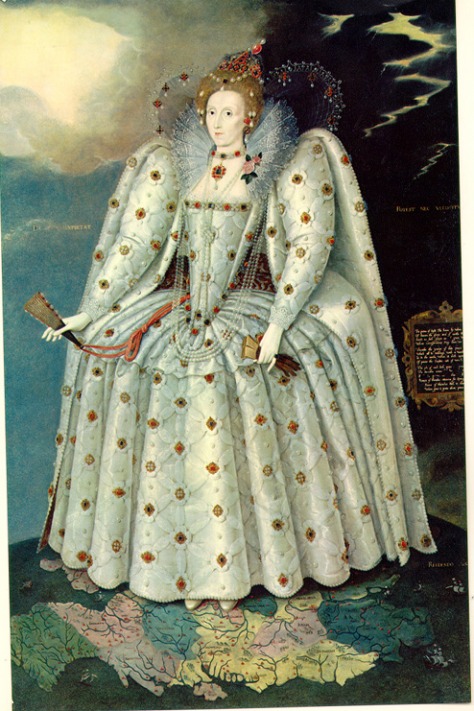
MAIN CHARACTERS
Elizabeth I was a highly intelligent woman, demonstrated by her survival in the most dangerous, uncertain and tumultuous situations.As well as a stateswoman, she was also an accomplished musician, playing the lute her whole life. It is, therefore, not surprising to suggest that she did, indeed, give birth to genius. She already possessed her own.
Queen Elizabeth I, Mother, Unvirgin Queen
Sir Robert Dudley, Father
John Dee, Mentor, Wizard
~ * Frances Bacon, Genius/Polymath *~
Denied his mother's scepter, did Bacon trade it for that of his muse Athena, becoming the Shaker of the Speare?
Queen Marguerite of Navarre, Lover
Shakespeare, the Living Mask
Pallas Athena, Spear-shaker Goddess of Arts & Science
Sir Nicholas Bacon, Lawyer, Foster Father
Anthony Bacon, Foster Brother
Robert Essex, Natural Brother
James I, Succesor, King of England
SIX DEGREES OF TUDOR BACON: A Virgin Birth, a Nom de Plume?
'William Tudor', aka Sir Francis Bacon wrote Shakespeare's Sonnets & Plays amidst an Atmosphere of Elizabethan Espionage "
The Divine Majesty takes delight to hide his work … according to the innocent play of children … Surely for thee to follow the example of the Most High God cannot be censured … Therefore, put away popular applause … and after the manner of Solomon, the King … compose a history of thy time and fold it into enigmatical writings … and cunning mixtures of the theatre …"-Francis Bacon
DEFINING MOMENT: 1579. Bacon’s Celestial visitation -- a clairaudient experience: "The glory of God is to conceal a thing, but the glory of a King is to find it out." "A flame of fire which fills all the room and obscures our eyes with its celestial glory -- heavenly voice. Follow the example of God. Put away popular applause. Compose a history of thy times and fold it into enigmatical writings and cunning mixtures of the theatre mingled as the colors in a painters shell and it will in due course of time be found."
His plan: 1) catalog and systematize "all the world's knowledge." (in English Language) 2) appear as model son to the Queen. Aid and support the administration of her realm. Give good advice. Enhance her image. Stay hidden behind the scenes. 3) Commit the true story to several ciphers. Live a secret (double) concealed life.
OPENING SCENE: 1992 Discovery of partial manuscript from Elizabethan times that contains 50 lines from Henry IV, handwriting verified to be Bacon's by Maureen Ward Gandy, leading graphologist of England. But how could Bacon produce that volume of work -- his own plus those called Shakespeare's? Besides his sigils, cyphers, and cryptography, he wrote a book on shorthand in 1590 and likely employed many assistants, like any scholar or artist might. He may have even used this secret script for dictation. So, not all works need be in his hand. Any of Bacon's "Good Pens" could have served as secretaries. Even the prolific can become more so with some technical assistance. He might be able to tell a tale, have it transcribed, then add his edits. There were corrections made to the Bard's published plays 10 years after his death. Shakespeare died in 1616, Fr. Bacon in 1626.
Elizabeth I was a highly intelligent woman, demonstrated by her survival in the most dangerous, uncertain and tumultuous situations.As well as a stateswoman, she was also an accomplished musician, playing the lute her whole life. It is, therefore, not surprising to suggest that she did, indeed, give birth to genius. She already possessed her own.
Queen Elizabeth I, Mother, Unvirgin Queen
Sir Robert Dudley, Father
John Dee, Mentor, Wizard
~ * Frances Bacon, Genius/Polymath *~
Denied his mother's scepter, did Bacon trade it for that of his muse Athena, becoming the Shaker of the Speare?
Queen Marguerite of Navarre, Lover
Shakespeare, the Living Mask
Pallas Athena, Spear-shaker Goddess of Arts & Science
Sir Nicholas Bacon, Lawyer, Foster Father
Anthony Bacon, Foster Brother
Robert Essex, Natural Brother
James I, Succesor, King of England
SIX DEGREES OF TUDOR BACON: A Virgin Birth, a Nom de Plume?
'William Tudor', aka Sir Francis Bacon wrote Shakespeare's Sonnets & Plays amidst an Atmosphere of Elizabethan Espionage "
The Divine Majesty takes delight to hide his work … according to the innocent play of children … Surely for thee to follow the example of the Most High God cannot be censured … Therefore, put away popular applause … and after the manner of Solomon, the King … compose a history of thy time and fold it into enigmatical writings … and cunning mixtures of the theatre …"-Francis Bacon
DEFINING MOMENT: 1579. Bacon’s Celestial visitation -- a clairaudient experience: "The glory of God is to conceal a thing, but the glory of a King is to find it out." "A flame of fire which fills all the room and obscures our eyes with its celestial glory -- heavenly voice. Follow the example of God. Put away popular applause. Compose a history of thy times and fold it into enigmatical writings and cunning mixtures of the theatre mingled as the colors in a painters shell and it will in due course of time be found."
His plan: 1) catalog and systematize "all the world's knowledge." (in English Language) 2) appear as model son to the Queen. Aid and support the administration of her realm. Give good advice. Enhance her image. Stay hidden behind the scenes. 3) Commit the true story to several ciphers. Live a secret (double) concealed life.
OPENING SCENE: 1992 Discovery of partial manuscript from Elizabethan times that contains 50 lines from Henry IV, handwriting verified to be Bacon's by Maureen Ward Gandy, leading graphologist of England. But how could Bacon produce that volume of work -- his own plus those called Shakespeare's? Besides his sigils, cyphers, and cryptography, he wrote a book on shorthand in 1590 and likely employed many assistants, like any scholar or artist might. He may have even used this secret script for dictation. So, not all works need be in his hand. Any of Bacon's "Good Pens" could have served as secretaries. Even the prolific can become more so with some technical assistance. He might be able to tell a tale, have it transcribed, then add his edits. There were corrections made to the Bard's published plays 10 years after his death. Shakespeare died in 1616, Fr. Bacon in 1626.
CLANDESTINE PRACTICES
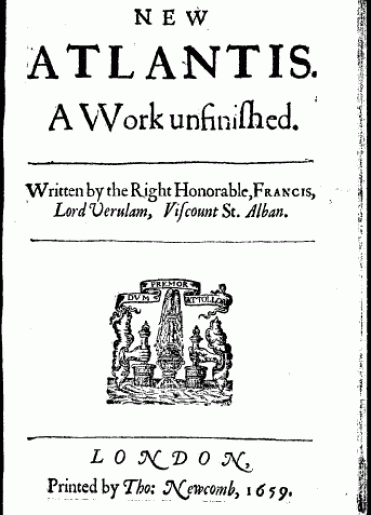
"A man is crazy who writes a secret in any other way
than one which will conceal it from the vulgar."
~Roger Bacon, The Wisdom of Keeping Secrets, 1250
“In time the secret truth shall be revealed” ~Francis Bacon, New Atlantis, 1617
“A mixture of a lie doth ever add pleasure.”
~Francis Bacon, Essay on Truth, 1601
“If a man will begin with certainties,
He shall end in doubts.
But if he shall be content to begin with doubts
He shall end in certainties.” ~Francis Bacon
"Tis in my memory locked
And you yourself shall keep the key of it." ~Shakespeare
There be three degrees of this hiding and veiling of a man’s self. The first, closeness, reservation, and secrecy; when a man leaveth himself without observation, or without hold to be taken, what he is. The second, dissimulation, in the negative; when a man lets fall signs and arguments, that he is not, that he is. And the third,simulation, in the affirmative; when a man industriously and expressly feigns and pretends to be, that he is not. ~Fr. Bacon, Essay on Simulation and Dissimulation *
In the seventh place, the greatest device for concealment is that of shorthand, which is a method of noting and writing down as briefly as we please and as rapidly as we desire; by this method many secrets are written in the books of the Latin-using peoples. I have thought fit to touch upon these methods of concealment because I may perhaps, by reason of the importance of my secrets, employ some of these methods, and it is my desire to aid in this way, at least you, to the extent of my ability. ~ Roger Bacon, Nullity of Magic
Secret writing became a preoccupation of the English. The reasons for writing in cipher were many and varied. As a general rule, the use of cipher in the arts was related to concealing the author's position in society. Innumerable sixteenth and seventeenth century books were either written anonymously, or signed with initials or a bogus name; some of them were secretly acknowledged. This tradition continued through history, including the following: Robert Burton wrote as Democritus Junior, Sir Walter Scott anonymously, Rev. C. L. Dodgson as Lewis Carroll, Jean Francois Marie Arouet as Voltaire, Samuel Langhorne Clemens as Mark Twain. Again, Jean-Baptiste Poquelin wrote under the pseudonym of Moliere, Richard Harris Barham as Thomas Ingoldsby, Amandine Lucile Dudevant as George Sand. The three Bronte sisters, James Bridie and George Eliot used noms de plume . Books even have been written on the subject, such as The Bibliographical History of Anonyms and Pseudonyms , by A. Taylor and F. J. Mosher (1951). Voltaire is reported to have used 137 and Benjamin Franklin 57 pseudonyms.
Queen Elizabeth & Walsingham
than one which will conceal it from the vulgar."
~Roger Bacon, The Wisdom of Keeping Secrets, 1250
“In time the secret truth shall be revealed” ~Francis Bacon, New Atlantis, 1617
“A mixture of a lie doth ever add pleasure.”
~Francis Bacon, Essay on Truth, 1601
“If a man will begin with certainties,
He shall end in doubts.
But if he shall be content to begin with doubts
He shall end in certainties.” ~Francis Bacon
"Tis in my memory locked
And you yourself shall keep the key of it." ~Shakespeare
There be three degrees of this hiding and veiling of a man’s self. The first, closeness, reservation, and secrecy; when a man leaveth himself without observation, or without hold to be taken, what he is. The second, dissimulation, in the negative; when a man lets fall signs and arguments, that he is not, that he is. And the third,simulation, in the affirmative; when a man industriously and expressly feigns and pretends to be, that he is not. ~Fr. Bacon, Essay on Simulation and Dissimulation *
In the seventh place, the greatest device for concealment is that of shorthand, which is a method of noting and writing down as briefly as we please and as rapidly as we desire; by this method many secrets are written in the books of the Latin-using peoples. I have thought fit to touch upon these methods of concealment because I may perhaps, by reason of the importance of my secrets, employ some of these methods, and it is my desire to aid in this way, at least you, to the extent of my ability. ~ Roger Bacon, Nullity of Magic
Secret writing became a preoccupation of the English. The reasons for writing in cipher were many and varied. As a general rule, the use of cipher in the arts was related to concealing the author's position in society. Innumerable sixteenth and seventeenth century books were either written anonymously, or signed with initials or a bogus name; some of them were secretly acknowledged. This tradition continued through history, including the following: Robert Burton wrote as Democritus Junior, Sir Walter Scott anonymously, Rev. C. L. Dodgson as Lewis Carroll, Jean Francois Marie Arouet as Voltaire, Samuel Langhorne Clemens as Mark Twain. Again, Jean-Baptiste Poquelin wrote under the pseudonym of Moliere, Richard Harris Barham as Thomas Ingoldsby, Amandine Lucile Dudevant as George Sand. The three Bronte sisters, James Bridie and George Eliot used noms de plume . Books even have been written on the subject, such as The Bibliographical History of Anonyms and Pseudonyms , by A. Taylor and F. J. Mosher (1951). Voltaire is reported to have used 137 and Benjamin Franklin 57 pseudonyms.
Queen Elizabeth & Walsingham
STATE SECRETS - A Clandestine Birth
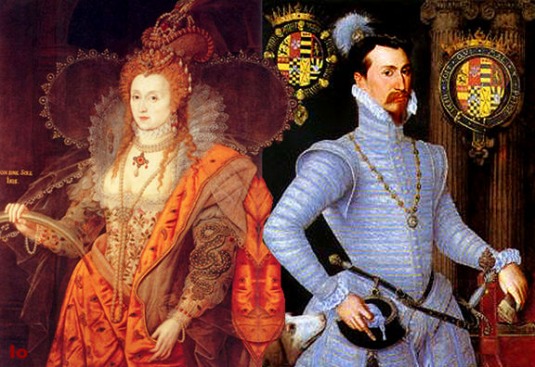
Queen Elizabeth & Dudley
The glory of God is to conceal a thing,
but the glory of a King is to find it out.— Francis Bacon
TO KNOW, TO DO, TO DARE, TO BE SILENT
--Hermetic Axiom*
"An idea is perpetuated because it must never be mentioned." --A. Crowley, "On Silence & Secrecy"
STATE SECRETS: Like Alexander and Julius Caesar, Elizabeth left no legitimate issue, but had natural children. She enforced a conspiracy of silence on both her sons that condemned them all to frustration and tragedy. Her sons remained concealed princes. Elizabeth was never sure if she would admit them to the succession or not. Francis Bacon (1561-1626), firstborn of two unclaimed children of Elizabeth I and Sir Robert Dudley, Earl of Leichester, is the true author of Shakespeare’s works. His true political identity is revealed in them through cyphers he learned from his mentor, Magus and the first 007 Secret Agent Dr. John Dee, who solidified the Rosicrucians in England. The Reformation was a Rosicrucian project. The Rosicrucians used poetry, art and theater to wage war on the Vatican.
The glory of God is to conceal a thing,
but the glory of a King is to find it out.— Francis Bacon
TO KNOW, TO DO, TO DARE, TO BE SILENT
--Hermetic Axiom*
"An idea is perpetuated because it must never be mentioned." --A. Crowley, "On Silence & Secrecy"
STATE SECRETS: Like Alexander and Julius Caesar, Elizabeth left no legitimate issue, but had natural children. She enforced a conspiracy of silence on both her sons that condemned them all to frustration and tragedy. Her sons remained concealed princes. Elizabeth was never sure if she would admit them to the succession or not. Francis Bacon (1561-1626), firstborn of two unclaimed children of Elizabeth I and Sir Robert Dudley, Earl of Leichester, is the true author of Shakespeare’s works. His true political identity is revealed in them through cyphers he learned from his mentor, Magus and the first 007 Secret Agent Dr. John Dee, who solidified the Rosicrucians in England. The Reformation was a Rosicrucian project. The Rosicrucians used poetry, art and theater to wage war on the Vatican.
Concealed Prince
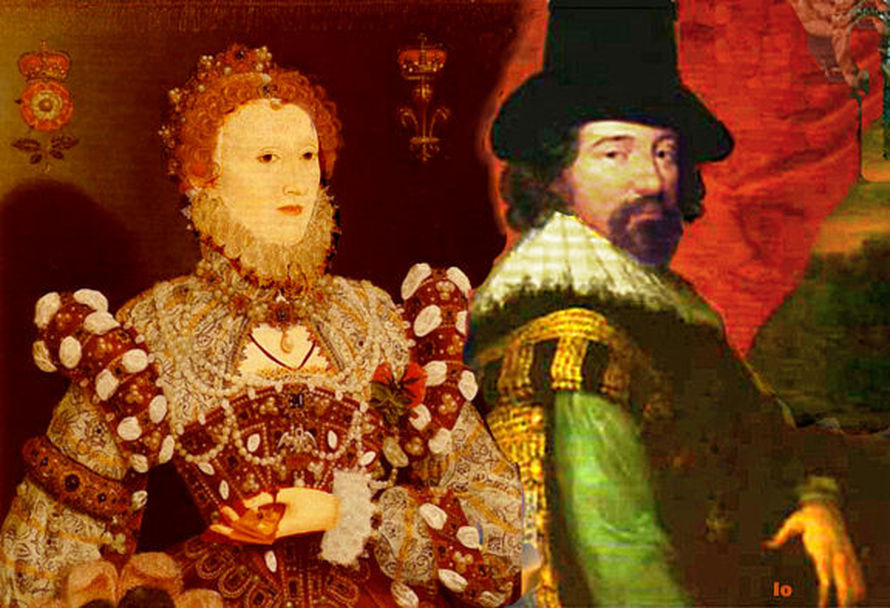
*
Elizabeth & Bacon, Lord Verulam
SECRET SOCIETIES
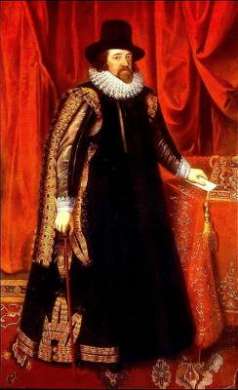
SECRET SOCIETIES: The Tudor scion if not prince, Francis founded British Freemasonry in 1584, so ancient wisdom would be passed down, forevermore. Jilted out of his material kingdom, he sought his place among the immortals, as Father of the Scientific Method. Indisputably, he was the chief figure of the English Renaissance in both science and literature. He was the Godfather of The Enlightenment, the democratization of illumination. Secret Societies could not flourish under Catholicism, but for Protestants provided an intellectual circle beyond royal influence. Freemasonry was able to take hold in the New World - New Atlantis - as Revolution then a Republican form of government.
STATE SERVICE
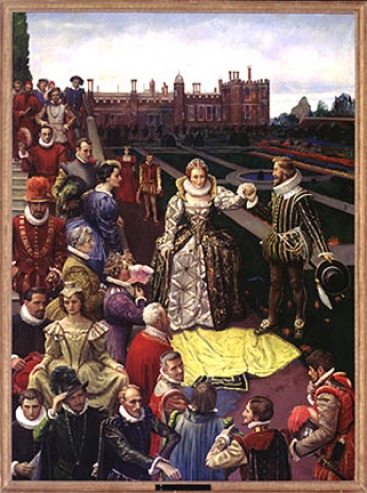
Many prominent figures in Elizabeth's court are represented in a scene set in the gardens of Hampton Court, the Queen's summer palace. Apart from the Queen and Sir Walter, onlookers include Dr. John Dee, the Queen's astrologer; John Bull, the court organist; Elizabeth Throckmorton; Sir Christopher Hatton; Sir Francis Walsingham; William Cecil, Lord Burghley; Robert Dudley, Earl of Leicester; Henry Carey, Baron Hunsdon; Sir Francis Drake; Sir Humphrey Gilbert; and Francis Bacon as a youth.
STATE SERVICE: Bacon was a global visionary -- the prime mover of the Virginia Company [Chesapeake Bay and Roanoke Island], the guiding spirit of colonization. He probably edited the King James Bible. He became a practising lawyer in 1582, and was appointed Queen Elizabeth's Counsellor in 1591. He was knighted in 1603, made Solicitor General in 1607, Attorney General in 1613, and Lord High Chancellor in 1618, occupying the highest public post next to the throne itself. He received the titles of Baron Verulam in 1618 and Viscount St Albans in 1621. The man who would be king achieved the next-best thing.
STATE SERVICE: Bacon was a global visionary -- the prime mover of the Virginia Company [Chesapeake Bay and Roanoke Island], the guiding spirit of colonization. He probably edited the King James Bible. He became a practising lawyer in 1582, and was appointed Queen Elizabeth's Counsellor in 1591. He was knighted in 1603, made Solicitor General in 1607, Attorney General in 1613, and Lord High Chancellor in 1618, occupying the highest public post next to the throne itself. He received the titles of Baron Verulam in 1618 and Viscount St Albans in 1621. The man who would be king achieved the next-best thing.
BLOOD ROYAL
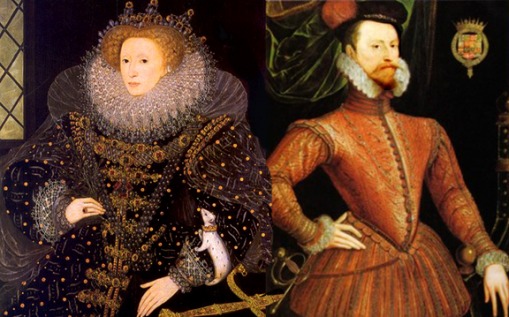
BLOOD ROYAL: Bacon was a love child -- the natural son of Queen Elizabeth, and was in truth "William Tudor," who was secretely writing as Shakespeare and under other pen names.
The Queen's wedding (1561) and offspring (1561, Essex 1566) were State Secrets, hinting at foul play in the removal of Dudley's wife. These children, politically inconvenient truths, were often not in her Virgin Queen favor.
The Queen's wedding (1561) and offspring (1561, Essex 1566) were State Secrets, hinting at foul play in the removal of Dudley's wife. These children, politically inconvenient truths, were often not in her Virgin Queen favor.
Inconvenient Truths
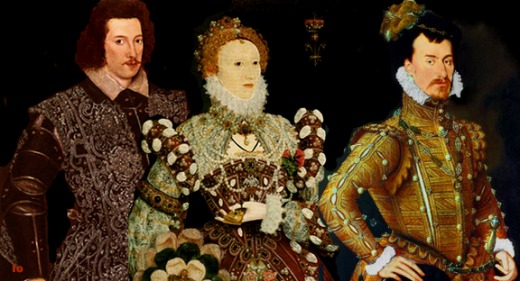
Essex, Elizabeth, Dudley
Though adopted by Nicholas Bacon, Francis knew himself to be royal soon enough, and never missed an opportunity to wear the royal purple, appropriate or not. There was an extraordinary likeness between Francis Bacon and the Queen. Both had commanding intellects. He realized knowledge is power and used his intelligence for gathering Intelligence, also.
Denied his worldly kingdom, Francis became King of the "World of the Mind," emphasizing empiricism and induction, while his philosophy was infused with magic and the occult. Both art and literature were used to convey covert meanings. Bacon was the Master Mason, firmly seated between the Pillars of Solomon as his throne, theoretically commanding both nature and mankind, through Wisdom, Strength and Beauty.
Though adopted by Nicholas Bacon, Francis knew himself to be royal soon enough, and never missed an opportunity to wear the royal purple, appropriate or not. There was an extraordinary likeness between Francis Bacon and the Queen. Both had commanding intellects. He realized knowledge is power and used his intelligence for gathering Intelligence, also.
Denied his worldly kingdom, Francis became King of the "World of the Mind," emphasizing empiricism and induction, while his philosophy was infused with magic and the occult. Both art and literature were used to convey covert meanings. Bacon was the Master Mason, firmly seated between the Pillars of Solomon as his throne, theoretically commanding both nature and mankind, through Wisdom, Strength and Beauty.
Star-Crossed Lovers
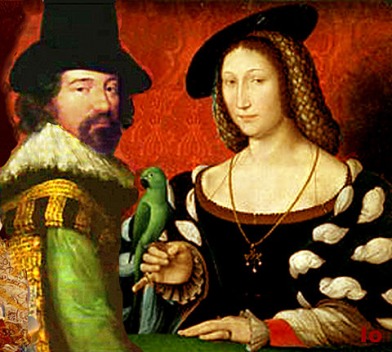
Francis & Marguerita
OBFUSCATION: Historical controversy is often supported on one side by the party line: a lie becomes the official truth and is difficult to refute, since obfuscation simply tires most intellects. Realizing his double-bind, Francis was likewise ambivalent about his fate in his writings, both concealing and revealing a deeper reality to the discerning or initiated.
Bacon had many secrets to conceal, including his penchant for his own sex, despite the fact he had fallen head over heels at 16 for the daughter of Catherine de Medici -- Marguerite de Valois at the French Court (1576-1579). "Shakespeare" was in love and may have remained tragically so his whole life when his mother refused to let him marry a divorced Catholic. Foster brother Anthony was charged with sodomy in the summer of 1586, though the charges were suppressed.
OBFUSCATION: Historical controversy is often supported on one side by the party line: a lie becomes the official truth and is difficult to refute, since obfuscation simply tires most intellects. Realizing his double-bind, Francis was likewise ambivalent about his fate in his writings, both concealing and revealing a deeper reality to the discerning or initiated.
Bacon had many secrets to conceal, including his penchant for his own sex, despite the fact he had fallen head over heels at 16 for the daughter of Catherine de Medici -- Marguerite de Valois at the French Court (1576-1579). "Shakespeare" was in love and may have remained tragically so his whole life when his mother refused to let him marry a divorced Catholic. Foster brother Anthony was charged with sodomy in the summer of 1586, though the charges were suppressed.
Initiations
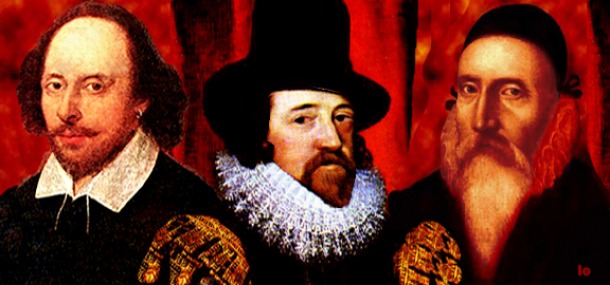
Shakespeare, Bacon, Dee
In 1593, while attending Gray's Inn Law School and suffering from economic difficulties, Bacon was granted Twickenham Park, by the Queen, a villa on 87 acres, opposite the Queen's Tudor Palace at Richmond. From her window the Queen was able to watch any improvements Bacon made upon the property and at the same time be in close proximity to Francis so she could keep her eye on her son and his activities. He formed an intentional writers community, perhaps the greatest literary achievement the world has ever seen! He was the spearhead of his Lodge of "good pens" and Masons. They wrote and practiced dramatic rituals of initiation. He used his circle of writers to create public opinion, initiating a legacy of psychological warfare and public psychodrama by secret secret societies that is embodied in the mind controlling and cultural effects of media today.
In 1593, while attending Gray's Inn Law School and suffering from economic difficulties, Bacon was granted Twickenham Park, by the Queen, a villa on 87 acres, opposite the Queen's Tudor Palace at Richmond. From her window the Queen was able to watch any improvements Bacon made upon the property and at the same time be in close proximity to Francis so she could keep her eye on her son and his activities. He formed an intentional writers community, perhaps the greatest literary achievement the world has ever seen! He was the spearhead of his Lodge of "good pens" and Masons. They wrote and practiced dramatic rituals of initiation. He used his circle of writers to create public opinion, initiating a legacy of psychological warfare and public psychodrama by secret secret societies that is embodied in the mind controlling and cultural effects of media today.
Shakesperean Mask
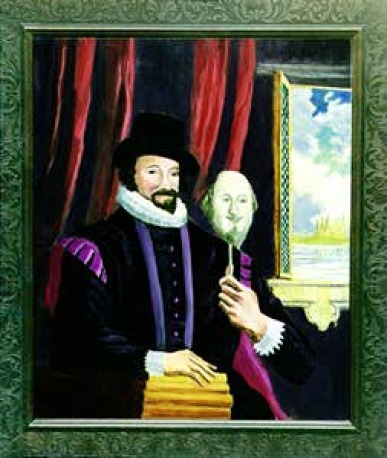
LOVE'S LABOR LOST: Denied both his kingdom and the love of his life, Bacon was driven to commit his story to drama. The story of Love's Labor's Lost concerns a youthful King of Navarre and four of his courtiers, the Lords Dumaine, Longaville, Berowne and Boyesse and four ladies of the court. The drama contains a real life love affair that existed between Francis Bacon and Marguerite de Valois (the daughter of Catherine de Medici and King Henry of Navarre) when he was visiting France in 1576-8. The names of the four Lords are taken directly from the passport of Anthony Bacon when he was living in the Navarre territory (1583-92). In "Of Love," Francis Bacon writes, "The stage is more beholding to love, than the life of man. For as to the stage, love is ever matter of comedies, and now and then of tragedies; but in life it doth much mischief; sometimes like a siren, sometimes like a fury."
Elizabethan Espionage
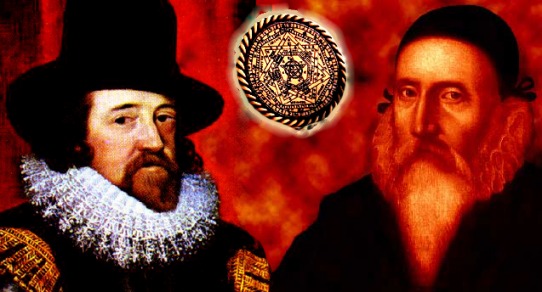
DEEP COVER: Sir Francis Walsingham organised a secret service, which at one time employed 53 agents on the Continent. One of his most accomplished assistants was Anthony Bacon--the brother of Francis--but the best of his cryptanalysts was Thomas Phelippes, a widely-travelled educated man, who was capable of solving ciphers in five languages. Walsingham opened a secret cipher school in London and all of his agents (including Francis) had to take a course in cryptography before they were entrusted with service abroad.
Of course, Walsingham's Secret Service was not solely concerned with foreign affairs, but was designed to protect the Queen from treasonable activities on her own doorstep as well. History shows that cryptography was one of Elizabeth's most valuable political assets, intercepting Mary, Queen of Scots's secret messages, with the result that all of the conspirators to depose Elizabeth, including Mary herself, were finally arrested. Walsingham later claimed that his agents had found the keys to about 50 different ciphers in Mary's apartments.
Decoding Shakespeare
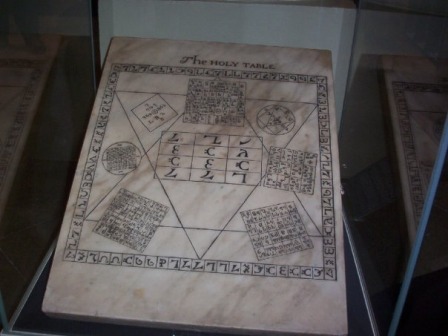
DECODING SHAKESPEARE: The Rosicrucians claim Francis was a reincarnation of brilliant alchemist, Franciscan monk Roger Bacon (1214-1294).Many magic spells and alchemical formulae were simply a scholar’s code, meant to protect scientific secrets. Both championed the experimental method.Dee was a noted astrologer and mathematician. He, like Pythagoras and Bacon, believed, thateverything in heaven and earth had a number assigned to it. He thought that if you could determine the number, mathematically or cabalistically, you could control events. He also believed that the position of the stars affected life on earth.
John Dee’s library spurred a revival of Greek ideas and his books were accessible to all the great thinkers of England at the time. This was to be the embryo of the Royal Society, a collection of great philosophers and scientific thinkers who credited Francis Bacon for its’ ideals that emulated his work called, The New Atlantis. Francis Bacon succeeded in achieving what Roger Bacon tried so desperately, but failed to attain. He became the spirit of the new scientific revolution – Bacon’s methodology towards science, to challenge any piece of evidence deemed spurious or obtained by incorrect method.
According to the Story of Philosophy, by Will Durant, philosophy, rather than science was in the long run Bacon’s love. The Baconian Spirit rang out in his words in “The Interpretation of Nature’: I believe myself born for the service of mankind….to shed some light on the present limits and borders so human discoveries would reveal and bring into clear view every nook and cranny of darkness….that discovery would be the true Extender of the Kingdom of Man over the universe, the Champion of human liberty, and the exterminator of the necessities that now keep man in bondage. He felt that he had a ‘kinship and connection with truth.’ He was truly a Philosopher King, who’s kingdom lay beyond mere sight.
THE MAGIC IN SHAKESPEARE
In THEY KNEW THE UNKNOWN (1971), parapsychologist Martin Ebon gives a good review of magic and witchcraft in the Shakespearean plays. He describes a straight line that leads from the witchcraft pamphleteers of the fifteenth century to the Gothic novels of today. He describes how Shakespeare gave dramatic form to the dreams, legends, claims and counter-claims of supernatural derring-do that abounded in his lifetime. Ebon concludes, Shakespeare certainly studied the witchcraft literature, notably Reginald Scot's THE DISCOVERY OF WITCHCRAFT (Edinburgh, 1584). "The lurid stories invented by the witch hunters, and in some cases accused or deluded witches themselves, were the horror fiction of the period, redolent with details of sexual aberration."
THE OCCULT REVIEW (London, 1921) ran an article on "Shakespeare and the Occult" noting many of his plays contain excursions into the realm of the supernatural, including ghosts, witches and sprites, that might shed light on the poet's own beliefs. In that era, belief in the occult was virtually universal, and the play are unintelligible without insight into that occult thinking.
Shakespeare is most specific in THE TEMPEST, where the protagonist Prospero is known to be based on Magus John Dee who claimed the "power of man's will over over inanimate matter," dramatizing that matter is only an illusion. Prospero succeeds in controlling man and the elements because "he represents mind--the ultimately on which the universe is based."
In "The Psychic World of William Shakespeare", the psychic content reflects the psychic world of Elizabethan England. Sherman Yellen noted Shakespeare believed in prophecy, witchcraft, astrology, magic and ghosts." He calls him the first true psychic researcher, but that honor is better accorded to others, including Francis Bacon and John Dee or others of the European adepts.
Richard III reflects "the dark, malign force of the supernatural in the history play," while A Midsummer Night's Dream offers the light, genial acceptance of those forces in a comedy. Only villains or misguided men attempt to ignore the supernatural at their peril, such as Edmund in King Lear, Iago in Othello, and Cassius in Julius Caesar.
Hamlet dramatizes that the assertions of the ghost are correct and that supernatural predictions are part and parcel of acceptance of one's fate, of predetermination. Like modern ghosts, these Shakespearean wraiths are usually seen by only one person. He knew his audience were eager for psychic drama, such as the witches in Macbeth.
Dr. Jan Ehrenwald pointed out the telepathy in Macbeth in his article of the same title (1941). He notes the witches grasped Macbeth's repressed wish by telepathy, so their prophecy is a reflection of his own secret hopes and ambitions, and subconscious sinister designs -- intuitive insight.
Clearly, the Bard respected the supernatural.
John Dee’s library spurred a revival of Greek ideas and his books were accessible to all the great thinkers of England at the time. This was to be the embryo of the Royal Society, a collection of great philosophers and scientific thinkers who credited Francis Bacon for its’ ideals that emulated his work called, The New Atlantis. Francis Bacon succeeded in achieving what Roger Bacon tried so desperately, but failed to attain. He became the spirit of the new scientific revolution – Bacon’s methodology towards science, to challenge any piece of evidence deemed spurious or obtained by incorrect method.
According to the Story of Philosophy, by Will Durant, philosophy, rather than science was in the long run Bacon’s love. The Baconian Spirit rang out in his words in “The Interpretation of Nature’: I believe myself born for the service of mankind….to shed some light on the present limits and borders so human discoveries would reveal and bring into clear view every nook and cranny of darkness….that discovery would be the true Extender of the Kingdom of Man over the universe, the Champion of human liberty, and the exterminator of the necessities that now keep man in bondage. He felt that he had a ‘kinship and connection with truth.’ He was truly a Philosopher King, who’s kingdom lay beyond mere sight.
THE MAGIC IN SHAKESPEARE
In THEY KNEW THE UNKNOWN (1971), parapsychologist Martin Ebon gives a good review of magic and witchcraft in the Shakespearean plays. He describes a straight line that leads from the witchcraft pamphleteers of the fifteenth century to the Gothic novels of today. He describes how Shakespeare gave dramatic form to the dreams, legends, claims and counter-claims of supernatural derring-do that abounded in his lifetime. Ebon concludes, Shakespeare certainly studied the witchcraft literature, notably Reginald Scot's THE DISCOVERY OF WITCHCRAFT (Edinburgh, 1584). "The lurid stories invented by the witch hunters, and in some cases accused or deluded witches themselves, were the horror fiction of the period, redolent with details of sexual aberration."
THE OCCULT REVIEW (London, 1921) ran an article on "Shakespeare and the Occult" noting many of his plays contain excursions into the realm of the supernatural, including ghosts, witches and sprites, that might shed light on the poet's own beliefs. In that era, belief in the occult was virtually universal, and the play are unintelligible without insight into that occult thinking.
Shakespeare is most specific in THE TEMPEST, where the protagonist Prospero is known to be based on Magus John Dee who claimed the "power of man's will over over inanimate matter," dramatizing that matter is only an illusion. Prospero succeeds in controlling man and the elements because "he represents mind--the ultimately on which the universe is based."
In "The Psychic World of William Shakespeare", the psychic content reflects the psychic world of Elizabethan England. Sherman Yellen noted Shakespeare believed in prophecy, witchcraft, astrology, magic and ghosts." He calls him the first true psychic researcher, but that honor is better accorded to others, including Francis Bacon and John Dee or others of the European adepts.
Richard III reflects "the dark, malign force of the supernatural in the history play," while A Midsummer Night's Dream offers the light, genial acceptance of those forces in a comedy. Only villains or misguided men attempt to ignore the supernatural at their peril, such as Edmund in King Lear, Iago in Othello, and Cassius in Julius Caesar.
Hamlet dramatizes that the assertions of the ghost are correct and that supernatural predictions are part and parcel of acceptance of one's fate, of predetermination. Like modern ghosts, these Shakespearean wraiths are usually seen by only one person. He knew his audience were eager for psychic drama, such as the witches in Macbeth.
Dr. Jan Ehrenwald pointed out the telepathy in Macbeth in his article of the same title (1941). He notes the witches grasped Macbeth's repressed wish by telepathy, so their prophecy is a reflection of his own secret hopes and ambitions, and subconscious sinister designs -- intuitive insight.
Clearly, the Bard respected the supernatural.
CIPHERS
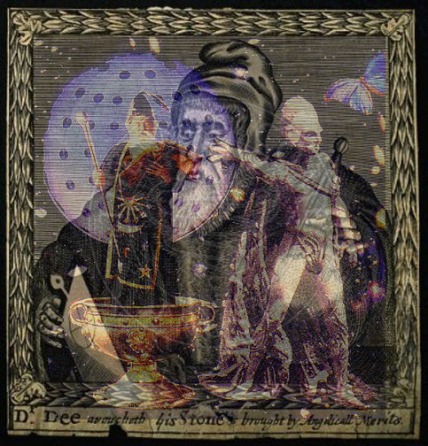
CIPHERS: Francis Bacon adopted all of Roger Bacon’s, Dante's and Dee’s methods of secret writing: ciphers, numbers, anagrams, printing errors, special type setting, gematria, hieroglyphics, allegorical pictures, emblematic head and tailpieces, watermarks, etc.Bacon was recognized as a poet. Some contend he wrote The Sonnets for his first love, Marguerite of the French Court. His frustration was vent in the Shakespearean plays according to Gallup who says: “That the cipher message is enclosed in the works I have deciphered I know, from years of hard and exhaustive study. There is no more doubt of the existence of the cipher and its message than there is of the Morse alphabet and its use at the present day. The study has been of thousands of pages, comparison and classification of hundreds of thousands of the italic letters, and I have the right to claim, and insist, that I know.” --Elizabeth Wells Gallup, The Biliteral Cypher of Sir Francis Bacon 1899-1990.
Roger Bacon [no relation], visionary John Dee and the gnostic Cathars are connected through the still-undeciphered Voynich Manuscript, an enigmatic esoteric cipher. But Bacon conceals yet reveals his identity and political status along with spiritual truths and heresies in his works. The rustic Shakespeare still gets credit for the concealed works of the polymath Bacon.
Roger Bacon [no relation], visionary John Dee and the gnostic Cathars are connected through the still-undeciphered Voynich Manuscript, an enigmatic esoteric cipher. But Bacon conceals yet reveals his identity and political status along with spiritual truths and heresies in his works. The rustic Shakespeare still gets credit for the concealed works of the polymath Bacon.
SUB ROSA
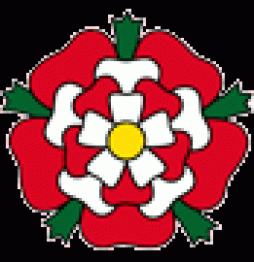
SUB ROSA: All means of clandestine activities took place under the Tudor Rose, stemming from the War of the Roses. To this day meetings pledged to secrecy are termed, 'sub rosa.' Synonymous with secrecy, it means strict confidentiality and a security classification equivalent to Top Secret. To the Rosicrucians of the age of Elizabeth, it hardly seems questionable that the rose was the symbol of silence, as among the ancients it was originally derived from the pagan tradition that the God of Love made the first rose, which he presented to the God of Silence. From this tradition originated the custom of carving a rose on the ceilings of banquet halls, or rooms where people met for gayety and diversion, to intimate that under it, whatever was spoken or done was not to be divulged; hence our term sub rosa used to indicate secrecy. The Cross,of course, signified salvation, to which the Society of the Rose-Cross devoted itself by teaching mankind the love of God and the beauty of brotherhood, with all that they implied.
There is also a connection between Bacon and the Rose-Cross of the Rosicrucians. Among the members of the ancient Society appear these initials, " Fra. F.B.; M.P.A.; " which, plainly stated, stand for Francis Bacon, Magister, Pictor, Architectus. A friend of Robert Fludd, only he could write,
"I writ the Rosicrucian Infallible Axiomata in four books, and study, not for my own sake only, but for them that study not for themselves. In the law I began to be a perfect clerk; I writ the idea of the Law, et., for the benefit of my friends, and practice in King's Bench.(the reader is referred to Bacon's Historia Vitae et Mortis, and legal writings including the Attorney's Academy.) I envy no man that knows more than myself, but pity them that knows less..... Now, intake midst of all my endeavours there is but one thought that dejects me, that my acquired parts must perish with myself, nor can be legacied amongst my dearly beloved and honoured friends."
There is also a connection between Bacon and the Rose-Cross of the Rosicrucians. Among the members of the ancient Society appear these initials, " Fra. F.B.; M.P.A.; " which, plainly stated, stand for Francis Bacon, Magister, Pictor, Architectus. A friend of Robert Fludd, only he could write,
"I writ the Rosicrucian Infallible Axiomata in four books, and study, not for my own sake only, but for them that study not for themselves. In the law I began to be a perfect clerk; I writ the idea of the Law, et., for the benefit of my friends, and practice in King's Bench.(the reader is referred to Bacon's Historia Vitae et Mortis, and legal writings including the Attorney's Academy.) I envy no man that knows more than myself, but pity them that knows less..... Now, intake midst of all my endeavours there is but one thought that dejects me, that my acquired parts must perish with myself, nor can be legacied amongst my dearly beloved and honoured friends."
ESPionage
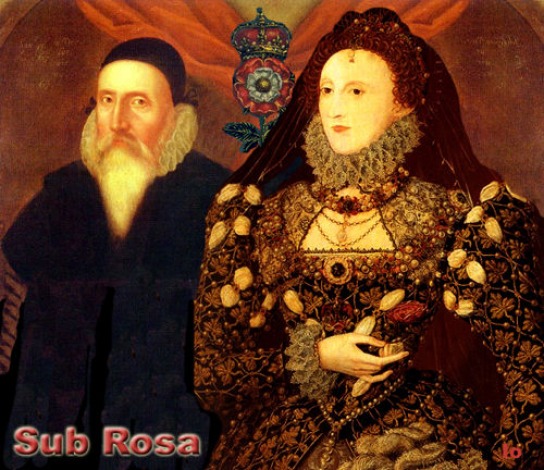
Dr. John Dee & Elizabeth
ELIZABETHAN ESPIONAGE: John Dee, the model for Faust and Prospero, was the most accomplished astrologer in Europe and confidante of Queen Elizabeth I. He used his ability to cast holoscopes as entre to all the great houses, kings and nobles of Europe. He was functioning as an intelligence agent. He was a spy for the British crown, insinuating himself into these various courtly scenes and then writing back to Elizabeth in cyphers that had previously only been used for magical purposes. In the 1580s, he was sending back data on the strengths of military garrisons and the placement of fortifications -- strategic details..
Meanwhile, Francis Bacon's foster brother, Anthony Bacon also travelled on the continent as an intelligencer for Walsingham, Burghley and the Queen. Anthony left England in September 1579 for a ‘tour’ of the continent. He sent back to his brother a constant stream of intelligence as well as a supply of books and manuscripts to support their literary work. He also helped to set up a special twelve-month journey (1581-2) for Francis to France, Spain, Italy, Germany and Denmark where he observed people, places, culture and religion and acted as a spy himself. Anthony returned in 1592 from twelve years abroad as an intelligencer to aid Francis. Anthony’s extensive correspondence with princes, statesmen, ambassadors, poets and writers across Europe fits remarkably well as a resource for the plays and Bacon’s source notebook, Promus of Formularies.
ELIZABETHAN ESPIONAGE: John Dee, the model for Faust and Prospero, was the most accomplished astrologer in Europe and confidante of Queen Elizabeth I. He used his ability to cast holoscopes as entre to all the great houses, kings and nobles of Europe. He was functioning as an intelligence agent. He was a spy for the British crown, insinuating himself into these various courtly scenes and then writing back to Elizabeth in cyphers that had previously only been used for magical purposes. In the 1580s, he was sending back data on the strengths of military garrisons and the placement of fortifications -- strategic details..
Meanwhile, Francis Bacon's foster brother, Anthony Bacon also travelled on the continent as an intelligencer for Walsingham, Burghley and the Queen. Anthony left England in September 1579 for a ‘tour’ of the continent. He sent back to his brother a constant stream of intelligence as well as a supply of books and manuscripts to support their literary work. He also helped to set up a special twelve-month journey (1581-2) for Francis to France, Spain, Italy, Germany and Denmark where he observed people, places, culture and religion and acted as a spy himself. Anthony returned in 1592 from twelve years abroad as an intelligencer to aid Francis. Anthony’s extensive correspondence with princes, statesmen, ambassadors, poets and writers across Europe fits remarkably well as a resource for the plays and Bacon’s source notebook, Promus of Formularies.
Clandestine / Occult
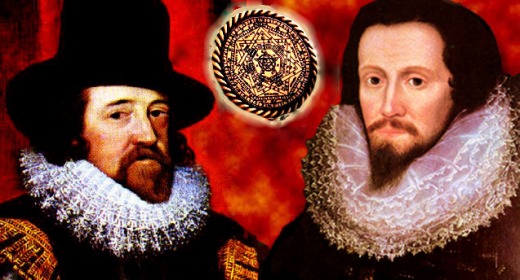
Francis learned people reading at an early age and to not let his face betray his words:
In few words, mysteries are due to secrecy… As for talkers and futile persons, they are commonly vain and credulous withal. For he that talketh what he knoweth, will also talk what he knoweth not. Therefore set it down, that an habit of secrecy, is both politic and moral. And in this part, it is good that a man’s face give his tongue leave to speak. For the discovery of a man’s self, by the tracts of his countenance, is a great weakness and betraying; by how much it is many times more marked, and believed, than a man’s words.~Essay on Simulation and Dissimulation, 1601
In few words, mysteries are due to secrecy… As for talkers and futile persons, they are commonly vain and credulous withal. For he that talketh what he knoweth, will also talk what he knoweth not. Therefore set it down, that an habit of secrecy, is both politic and moral. And in this part, it is good that a man’s face give his tongue leave to speak. For the discovery of a man’s self, by the tracts of his countenance, is a great weakness and betraying; by how much it is many times more marked, and believed, than a man’s words.~Essay on Simulation and Dissimulation, 1601
Dr. Dee at Court
